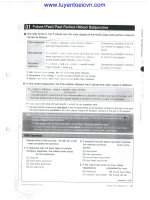Toeic Idioms Part 2 pot
Bạn đang xem bản rút gọn của tài liệu. Xem và tải ngay bản đầy đủ của tài liệu tại đây (98.97 KB, 11 trang )
For more English materials, please visit:
13
9. Strike out: fail or make a big mistake
He struck out with the big account. They decided not to purchase the product.
I don’t want to strike out on this project. I want it to be a success.
10. Go down swinging: keep trying until the end; never give it up
He didn’t win the account, but he went down swinging. I like that guy.
I’d rather go down swinging than not try at all.
11. Hit a home run: to be very successful
That company really hit a home run with their new technology. Everyone is
using it now.
She has started three companies, and they’ve all been very successful. She
always hits home run.
12. Ahead of the game: prepared for what’s coming; ahead of schedule
Next month is the end of the quarter. I have to get my work finished early so I can
get ahead of the game.
Our new product should help our company get ahead of the game.
13. Add up: make sense; result in something
It doesn’t add up. He’s losing money, but he’s still hiring new people.
It all adds up to trouble. Changing the design and rushing the products to market
will create more problems.
For more English materials, please visit:
14
UNIT 5. COMMUNICATION PROBLEMS
Person A: Our supervisor, Sally, called a meeting yesterday to talk about the
communication problems in our group. She got the ball rolling by asking
us to talk about the problems we were seeing. She asked us not to name
names.
Person B: So did anybody step up to the plate?
Person A: Not at first. She had to encourage us. She said that we had to identify the
problems before we could find the solutions because they go hand in
hand. Maria spoke up first. She said she didn’t want to step on any one’s
toes, but she thought the workload needed to be divided more evenly.
Sally said that was a good start and that we were on the right track. We
needed to get everything out in the open. She reminded us that no topic
was out of bounds.
Person B: I though Maria brought the same problem up the last time, but Sally just
gave her the runaround then. Sally said she would check with the vice
president and get back to her, but she never did.
Person A: You’re right. I think Sally has been getting the same comment from other
people, so she’s finally ready to listen. Jerry said he was feeling out of the
loop because he doesn’t get included in the planning phases. Steven got
angry about that. He said that if Jerry always says he’s too busy to come
to the planning meetings, then how can he expect to be in the loop?
Person B: Wow, it sounds like Steven really screwed up when he lost his temper.
Person A: Yes, I agree. It was very unprofessional. Sally drew the line and
reminded everyone that the purpose of this meeting was not to get
personal and lay the blame but to try to improve the communication
For more English materials, please visit:
15
channels. She told Steven to sit down and knock it off. She said we
wanted to discuss his behavior later outside of the group. They agreed to
take it off-line.
Person B: That’s funny. I thought Sally was the one who usually got angry in the
meetings.
Person A: You’re right. She doesn’t exactly walk the talk. I think she needs to set a
better example.
1. Get the ball rolling: start something
He asked the first question in the meeting to get the ball rolling.
She got the ball rolling with the new team by asking the staff members to
introduce themselves.
2. Step up to the plate: take responsibility
We hope the power company will step up to the plate and explain the power
outrage.
If the mistake is his, I hope he will step up to the plate and take care of it.
3. Go hand in hand: be associated with; go together
Quality and efficiency go hand in hand. One usually accompanies the other.
This material goes hand in hand with the software to guide the user.
4. Step on someone’s toes: get in someone’s way; interfere with someone’s job or
responsibilities
I don’t want to step on your toes, so let me know if this is OK.
She was unpopular because she stepped on many toes.
5. Be on the right track: be going in the correct direction
We don’t have the problem solved yet, but I think we are on the right track.
If he says it’s a software problem, I think he is on the right track.
For more English materials, please visit:
16
6. Out of bounds: not acceptable
He was a problem student. His behavior was out of bounds, so he was sent to
the principal’s office.
That topic is out of bounds during the meeting. We will discuss it later off-line.
7. Give someone the runaround: not answer a question or request; send a person
somewhere else for an answer
She always gives me the runaround when I ask her out. Do you think she’s not
interested?
I could tell she didn’t want to answer the question. She just gave me the
runaround.
8. Be in the loop/be out of the loop: be included in the communication/not be
included in the communication
Please send her copies of the e-mail about this so she is in the loop about this
new project.
I haven’t received any information on this project. I am out of the loop on this.
10. Screw up: make a big error or mistake
She screwed up the order, and we had to start over again.
I usually screw up when I’m really tired and I keep working anyway.
11. Draw the line: establish limits or boundaries
We have to draw the line with this customer. They are demanding too much.
Tell them we won’t make any more design changes.
He drew the line with his teenage son and told him if he got another ticket, he
couldn’t continue driving.
12. Knock it off: stop doing “something”
He has an annoying habit of tapping his fingers on the table, so she asked him to
knock if off.
For more English materials, please visit:
17
The children were running around in the library, so the librarian asked them to
knock it off.
13. Take something off-line: talk about something privately/keep confidential
Let’s take this discussion off-line to deal with the confidential items.
We need to take this conversation off-line because it’s about the new
technology for our company, and that isn’t public knowledge yet.
14. Walk the talk: do what you say you’re going to do
If you want to be a good leader, you need to walk the talk so your employees
will know you lead by example.
She always speaks about the importance of listening, but she doesn’t walk the
talk because she doesn’t listen very well.
For more English materials, please visit:
18
UNIT 6. THE NEW ACCOUNTANTS
Person A: Have you met Anna Wong, the new accountant?
Person B: Yes, I met her yesterday. She seems to be really on the ball. I think she’s
a good choice.
Person A: I agree. The previous guy, Andy, was nice, but he liked to shoot the
breeze. I don’t think got much done.
Person B: I think Andy pulled strings to get the job. His brother-in-law is the CFO.
Person A I heard that he was fired for taking kickbacks from one of our customers.
Is that true?
Person B: I don’t know for sure, but that’s what I heard. The new person, Anna
seems very conservative. She goes by the book.
Person A: She’s also really on her toes. I asked her to help me with a cost estimate.
She just eyeballed it and was able to give me a figure right then and
there. When I went back to redo the figures, it all worked out.
Person B: I hope that sales for the new product will put us in the black.
Person A: Me, too. I know that it’s common for a start-up to be in the red in the
beginning, but I’ll feel better when we reach our sales goals.
1. Be on the ball: be smart; be intelligent; be a good worker
She’s really on the ball. She’s quick, efficient, and does good work.
I’m really glad you hired him because he’s on the ball.
2. Shoot the breeze: make informal conversation
I like to shoot the breeze with my friends. Sometimes we just sit and talk.
We shot the breeze for a few minutes before we got down to business.
3. Pull strings: take advantage of connection to achieve a goal
For more English materials, please visit:
19
He pulled strings to get the job. His father-in-law talked to the company
president about him.
She can pull strings whenever she wants something because her brother is the
CEO of the company.
4. Kickback: money or favors given in exchange for influence.
That company was fined for giving a kickback to the politicians in exchange for
contracts.
The U.S. government frowns on kickbacks for business.
5. Go by the book: closely follow procedures or rules
I want you to go by the book at first. You can get creative later, after you learn
the process.
She’s very careful and methodical. She always goes by the book.
6. On one’s toes: prepared to quickly move or react
He always gives us last minute changes to keep us on our toes.
If you work in Silicon Valley, you have to stay on your toes because things are
changing very quickly.
7. Eyeball it: estimate or guess based on a quick glance.
I don’t have a measuring tape, so I’ll just have to eyeball it.
I don’t have time to look at your proposal very carefully. Is it okay if I just eyeball
it?
8. In the red/ in the black: in debt/ not in debt
That company is in the red. They may go bankrupt if they keep losing money.
One more successful business venture should put us back in the black.
For more English materials, please visit:
20
UNIT 7. THE START-UP
Person A: Did you know that Krishna left for a job with that new Internet-based start-
up?
Person B: Yes, I heard that. I guess he decided to just go for the gold. They gave
him stock options.
Person A: I heard his wife also left her job to go to the same company. I guess they
decided it was time to go for it. They’ve both become dot.commers.
Person B: I think they took the risk because last year, he was offered a job and stock
in another start-up company, but he said no, and now the company has
gone public. He felt he really missed the boat. He would have been a
millionaire if he had taken that job.
Person A: Well, it’s a trade-off. I prefer a little more security. I’m not ready to risk it
all and go for broke. Some of those Internet-based companies make me
nervous. A lot of them won’t be around long. You know, some of them
have a really high burn rate. They often go through millions of dollars a
month in the start-up phase. I prefer working for a bricks-and-mortar
business. I think it’s important to have a physical presence in the
marketplace.
Person B: You may be right, but Krishna is a nice guy. I hope he lands on his feet
and does really well.
Person A: Well, nobody twisted his arm. He took the chance, and he know what
he’s doing. He could always come back here. He was careful not to burn
his bridges. He gave two weeks notice, and everyone appreciated that.
Person B: His wife is a talented researcher. If this venture falls through, she should
have a lot of other job opportunities. It’s not like they come up only once
For more English materials, please visit:
21
in a blue moon. There are lots of them around today for people with the
right skills.
1. Go for the gold: try for a difficult goal.
Let’s go for the gold. I want to set high goals this year.
She went for the gold when she put down her quarter goals.
2. Go for it: make an extra effort to meet a goal
If we’re going to make this quarter’s quota, we’ll have to really go for it.
I told him he would succeed if her really went for it.
3. Dot.com/ dot.commer: an Internet-based business/ an employee of an Internet-
based business.
I don’t think I’m ready to go to a dot.com and work 12 hours a day.
He left that big corporation and became a dot.commer because he hopes to
make a million dollars when the business goes public.
4. Miss the boat: miss the opportunity
He could have bought that stock last week at half the current price. He really
missed the boat.
She missed the boat when he said no to that deal. It turned out to be worth
millions.
5. A trade-off: an exchange; the act of giving up one thing to get another
If you cut back your hours to have more free time, you’ll make less money. It’s a
trade-off.
She gave up her dream car to buy a house. It was a trade-off.
6. Burn rate: the rate at which a new company spends money
The 10 million dollars of venture capital should last about five months at this
burn rate.
For more English materials, please visit:
22
The burn rate is really high with new Internet companies because marketing
costs are very high.
7. Bricks and mortar: a business with a physical building where goods are bought
and sold, as opposed to an Internet-based business, which sells products over
the World Wide Web.
We’re a bricks-and-mortar business. We still have a retail building where we
sell our products.
Bricks-and-mortar businesses in our town are facing competition from Internet-
based companies.
8. Land on one’s feet: recover from a problem or difficult challenge
His company outsourced his job, but he landed on his feet because he found a
new position in another department.
She managed to land on her feet when she made a career change; in fact, her
salary is still rising.
9. Twist someone’s arm: convince or persuade someone to do something
I didn’t want to go to the party, but she twisted my arm, so I went.
Lisa didn’t want to go to the dance alone, so she called a friend and twisted his
arm. He finally agreed to go along.
10. Burn one’s bridges: do something that will hurt or destroy a relationship
I wasn’t negative about why I left the job. I didn’t want to burn my bridges. I
might want to use my old boss as a reference.
He burned his bridges when he published that book about the politics at his old
company.
11. Fall through: fail or not happen
Our plans for the evening fell through, and we ended up staying home.
I’m counting on getting that contract; I hope it doesn’t fall through.
For more English materials, please visit:
23
12. Once in a blue moon: (Something that happens) rarely or very infrequently
We weren’t prepared for such a big snowstorm because it only happens once in
a blue moon around here.
He comes to visit once in a blue moon. I haven’t seen him for years.









